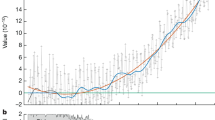Abstract
PROF. H. DINGLE has put forward1 the view that, while it is correct to deduce the “Fitzgerald contraction” of moving bodies from the Restricted Principle of Relativity, it is incorrect to deduce the slowing down of moving clocks. His main ground is that the second statement is meaningless, because a clock is not a well-defined measuring instrument. If, for example, it takes the form of a stream of equal grains of sand falling regularly in an hour-glass, the time elapsed may be measured equally well by the number of fallen grains, N1, or by their total mass, N2, or by their total volume, N3. Since mass and volume have different transformation laws for moving axes, Prof. Dingle infers that N1, N2, and N3 also have different transformation laws, some showing the retardation and others not.
This is a preview of subscription content, access via your institution
Access options
Subscribe to this journal
Receive 51 print issues and online access
$199.00 per year
only $3.90 per issue
Buy this article
- Purchase on Springer Link
- Instant access to full article PDF
Prices may be subject to local taxes which are calculated during checkout
Similar content being viewed by others
References
NATURE, 144, 888 (1939).
Author information
Authors and Affiliations
Rights and permissions
About this article
Cite this article
NEWMAN, M. "The Relativity of Time". Nature 144, 1046–1047 (1939). https://doi.org/10.1038/1441046b0
Issue Date:
DOI: https://doi.org/10.1038/1441046b0
Comments
By submitting a comment you agree to abide by our Terms and Community Guidelines. If you find something abusive or that does not comply with our terms or guidelines please flag it as inappropriate.



